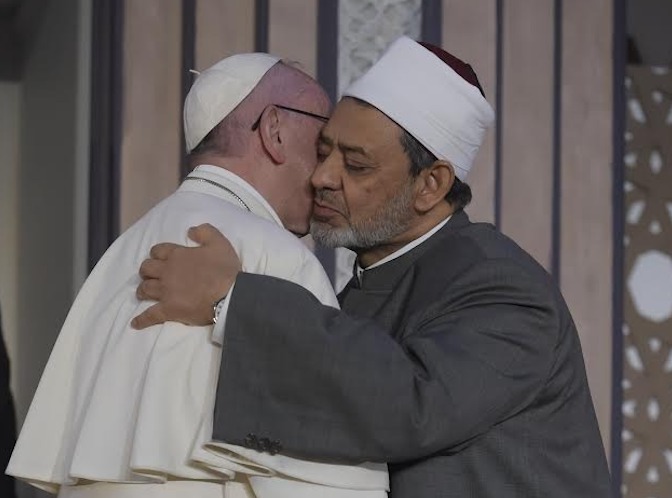12 Key Points From Pope Francis’ Al-Azhar Address
The Holy Father stressed importance of open-minded education and looking to God rather than affairs of this world.

In his speech at Al-Azhar university in Cairo today, Pope Francis placed an emphasis on education, drawing attention to Egypt’s ancient civilization that valued open-minded education and saying a similar commitment was required today.
The Pope, addressing participants of an International Peace Conference at the university, received a warm welcome and was enthusiastically applauded for parts of his speech.
Probably to avoid offending its Muslim members, who consider Jesus only a prophet, he seemed to deliberately omit any explicit mention of the Lord’s name, preferring to focus more generally on "God" and the “Absolute.”
Sheikh Ahmed el-Tayeb, the Grand Imam of Al-Azhar, the main center of learning for Sunni Muslims, has strongly condemned Islamic extremism, but Egypt's pro-government media has accused Al-Azhar of failing to do enough to reform the religious discourse in Islam.
Here are some key points from his speech:
* Education can become wisdom for life if it draws out men and women the best of themselves, is centered on human dignity, fosters a sense of identity, and overcomes temptations to rigidity and closed mindedness.
* Interreligious dialogue demands respect for one’s own identity and that of others, sincerity of intention, creating civility of encounter (the only alternative, he said, is incivility of conflict).
* We are “constantly called to walk together, in the conviction that the future also depends on the encounter of religions and cultures.”
* We need to “accompany young people”, helping them on the path to maturity, “growing heavenward” in each other’s company, and creating a “civilization of peace and encounter.” For this intention, he called on the intercession of Saint Francis of Assisi who tried to convert Sultan Malik al Kamil in Egypt.
* Working for the common good cannot be achieved if God is eliminated from the horizon, or if He is appropriated for oneself.
* Religion risks being “absorbed into the administration of temporal affairs” and “tempted by the allure of worldly powers that in fact exploit it” but we are not meant to “spend all our energies on the uncertain and shifting affairs of this world” but rather “journey towards the Absolute.” Religion reminds us “to lift our hearts to the Most High in order to learn how to build the city of man.”
* Despite the need for the Absolute, we must reject any “absolutizing” that would justify violence which is the “negation of every authentic religious expression.”
* The Pope stressed again a clear “No!” to “every form of violence, vengeance and hatred” carried out in the name of religion, and spoke of the “incompatibility of violence and faith,” saying peace alone is holy” and “no act of violence can be perpetrated in the name of God for it would profane his Name.”
* Religion is not meant to only unmask evil but promote peace, perhaps today “more than ever,” but without “giving in to forms of facile syncretism” but rather “praying for one another.”
* “It is of little or no use to raise our voices and run about to find weapons for our protection: what is needed today are peacemakers, not fomenters of conflict; firefighters and not arsonists; preachers of reconciliation and not instigators of destruction.”
* “Demagogic forms of populism are on the rise” which do not help “consolidate peace and stability.”
* To prevent conflicts and extremism and to build peace, it is essential to eliminate poverty and exploitation, shed light on “murky maneuverings that feed the cancer of war,” and end arms proliferation.
Reaction
One of the first to respond to the Pope’s address was Catholic Relief Services’ Egypt office.
In an April 28 statement, the Catholic humanitarian agency said it supported the Pope on the importance of inter-religious dialogue as a way to foster peaceful relationships between Christians and Muslims.
“This visit is an opportunity for Pope Francis to continue the outreach across the Christian and Muslim communities that began in May 2016, when he received at the Vatican the Grand Imam of Al-Azhar University,” said Art Kirby, CRS’ country representative in Egypt.
“It is also a chance for the Holy Father to express his solidarity with the Christian community in Egypt, which was affected by the Palm Sunday bombings that killed dozens,” Kirby said.
He added that he believed the inspiration the Pope provides the country’s Christians will be “massive” and that as Muslims and Christians have co-existed for centuries in Egypt, they “share common values and aspirations for their families and communities.” The Pope’s visit, Kirby said, “lends a credibility to these inter-religious dialogues that cannot be underestimated.”
- Keywords:
- al-azhar
- pope francis
- pope in egypt

















